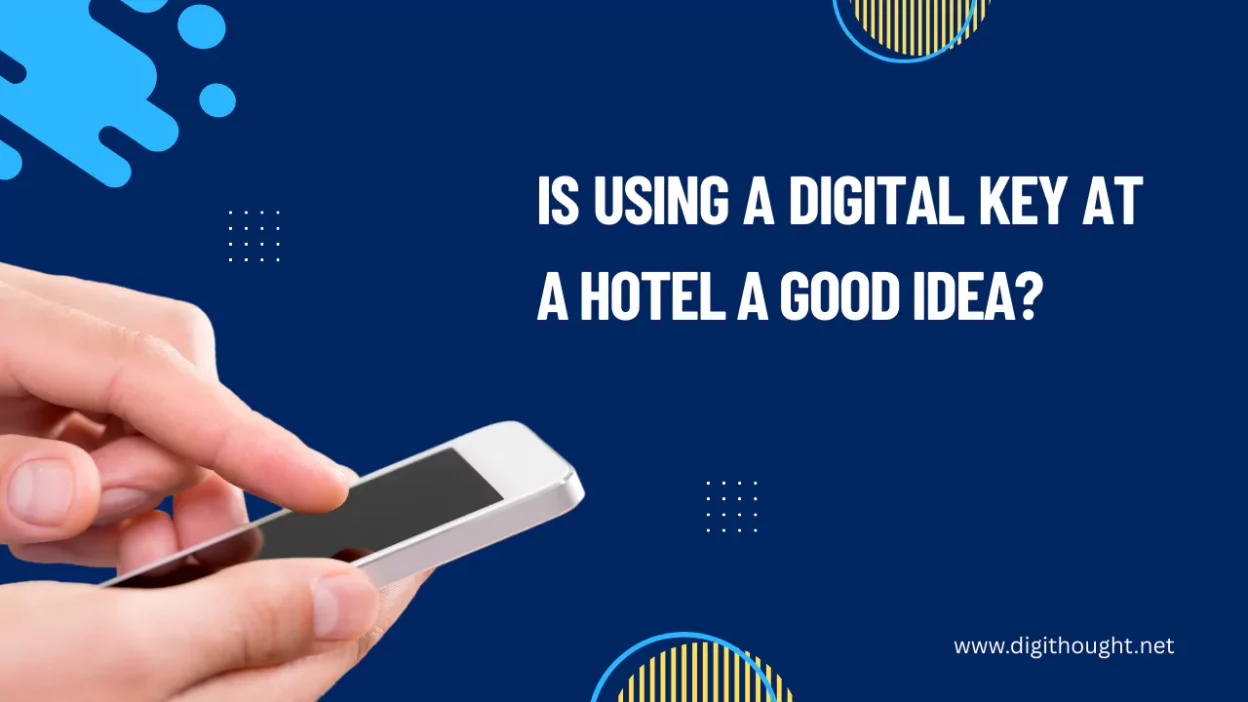Hotel stays are rapidly evolving, especially as technology reshapes the hospitality industry. One of the most significant advances to make its way into the hotel industry is the digital key. These are work-alike replacements for old-fashioned ‘room keys’: they not only promise simplicity and a check-in process that doesn’t require human contact, but contactless check-in is the ultimate consolation prize to help stave off cabin fever during winter.
But is using a digital key at a hotel a good idea? How do they compare with traditional room keys in terms of safety and convenience? If you are curious about hotel security, contactless check-in for convenience, or whether digital keys are as safe to use and convenient as advertised, we will discuss the potential benefits and common pitfalls associated with hotel digital keys.
What Exactly Is a Digital Key?
In its simplest form, a digital key is an alternative to the traditional keycard or physical key, using smartphones as the medium. As soon as you check in at a hotel (either by using the hotel’s app or through email), a digital key is sent to your smartphone. You can then enter your room by holding your smartphone against the door’s smart lock or using Bluetooth-based access.
For many travelers, this innovation solves some of the common pain points experienced in hotels. Digital key systems are widely used by major hotel brands such as Hilton and Marriott as part of the contactless check-in process. With digital keys via their devices, guests can go from the door to their room, skipping even coming to a front desk, and an unnecessary line at that point.
The Benefits of Digital Key Usage
Convenience and Contactless Check-In
First of all, it’s the most obvious advantage. With a digital key, you can completely bypass the check-in desk at your hotel. This is particularly handy after a long flight. Also, at peak check-in times when lines may discourage some arrivals who otherwise would have been eager to see their new lodgings for business reasons or convenience’s sake alone.
Additionally, in a post-pandemic world where touching high-contact surfaces is a public health issue, contactless check-in reduces physical interactions with staff and shared items (such as traditional keycards).
On the Other Side of the Coin
We’ve all had the moment of panic when we can’t find our room key. With a digital key, however, this worry ceases since ‘the key’ resides in your phone, so both would-be robbers and forgetful souls alike should find solace! Not only is your key always with you, but you’re also less likely to lose or demagnetize it accidentally (a common problem with plastic keycards).
Enhanced Hotel Service Integration
Equally important to the increase in convenience is the complementary nature of hotel service now, with additional app functions, thanks to integration with digitized keys.
For example:
- Control room settings (like lighting or temperature)
- Ask the janitor to come
- See hotel maps or an amenity guide
All of these features enhance your stay, at the same time it makes it feel more intimate and discriminating, not so unlike being served by attendants who know just what you want before you even open your mouth.
Environmental Benefits
Aside from needing fewer plastic key-cards, hotels themselves end up reducing a lot more waste than simply the cardboard boxes or corpses and so forth left by those who enter their premises.
In effect, the global hospitality industry added millions of plastic key cards alone into the world’s waste stream in 2010, resulting, authorities speculate, in all manner of problems for safety standards around hotels in general. Making things simpler makes them safer. A move to digital keys presents a more sustainable solution that goes beyond just what is needed for now or next year.
Potential Risks and Concerns of Digital Keys
Reliance on Smartphones and Battery Life
A major shortcoming of digital keys is their reliance upon the cell phone. What happens if your phone’s battery goes flat? Without other backup options, you may find yourself locked out of your room entirely, if driving is impossible, and that means losing a lot more than just time. Because this ‘downside’ does exist for digital keys, remember to never go anywhere without a portable charger!
Technical Glitches
Like any technology, digital keys are susceptible to bugs. Internet connection issues, app crashes, or server failures could happen. A 2022 report from Hospitality Technology highlights people who say they still prefer to have an old-fashioned key during any hotel experience for peace of mind.
Data Security and Privacy Issues
Digital key methods rely on systems; data security becomes an issue. That which one app gets in order to unlock all the rooms in any hotel is that it may soon be able to unlock locks off your mobile phone.
This is something that was rarely done, but cases in which loopholes have been exploited have cropped up. Wired’s story concerns researchers in 2018 who managed to produce a master digital key from a discarded smart key.
Chain management of hotels are trying to forestall this through rigorous encryption protocols and beefing up app security. However, as a user, you still need to take a few more precautions.
For example:
- Use strong passwords
- Do not log in to a public Wi-Fi network when you are using your digital key to access a room
Limited Take-Up in Hotels
(Digital keys are still not universal.) A major hotel group like Hilton or Marriott benefits from digital keys in its mature hotel facilities. This means there will still be a dual mode for several years in which traditional keycards and digital ones co-exist.
Excludes Travelers Not Technologically Proficient
If you aren’t to the point where you can easily call upon your favorite app and use it to open your room door, digital keys may present a real sense of things being trapped. Providing both old-fashioned and digital keys is a policy that includes everyone in the fun.
The Balance of Security and Conveniences
When it comes to using digital keys, hotel security is indeed an important consideration. Fortunately, at present, all reputable hotels that use digital keys have in place measures for keeping out the undesirables:
- Encryption: This shields the digital key data delivery process.
- Coming off-limits: Digital keys generally stop working once you check out of your room. This cuts down the chances of misuse.
- Two-Factor Authentication: In order to add an extra security layer, some systems demand further verifications such as PIN codes or biometric authentication.
Hotels are now pouring more resources into cybersecurity to quell worries over breaches while sparing no effort to ensure a comfortable experience for guests.
For travelers, taking steps to protect personal devices (e.g., locking your cellphone to prevent unauthorized personnel from accessing it and not using open networks) can go even further in countering risks.
So, Is Using a Digital Key at a Hotel a Good Idea?
With the advent of contactless check-in and digital keys, the hospitality sector is adapting itself to today’s travel modes. While the traditional keycard is still not totally outmoded, there is no doubt that digital keys are increasingly becoming a staple for hotel chains of moderate price range and greater luxury in every corner of the globe.
For most travelers, the convenience of a digital key far outweighs its disadvantages. If you look forward to faster check-ins, fewer physical touch points, and the ability for you or another to look after your stay from a smartphone is your wish then digital keys are an excellent choice.
For those still doubtful, it’s best to experiment with hotels that have both traditional and digital key options. Working this transitional pattern out in 2 samples can mean you always have the option of reverting back to a physical key.
Final Thoughts
Is using a digital key at a hotel a good idea? By and large, yes. It makes check-in easy for the guests and is in keeping with modern trends like contactless check-in because all you need to do is show your phone at reception rather than register your card via an actual machine.
However, one should also consider its possible side effects—for instance, being dependent on a device or that smaller hotels may not install them yet.
Whether you are a frequent traveler or planning a one-time journey, the digital key gives you a taste of how travel might look tomorrow. With an appreciation of its safety, a little bit of knowledge, and watching them, you can get all the gains of that.
For more insights into travel and technology, bookmark this blog and be the first one to know about the latest developments in hospitality.



